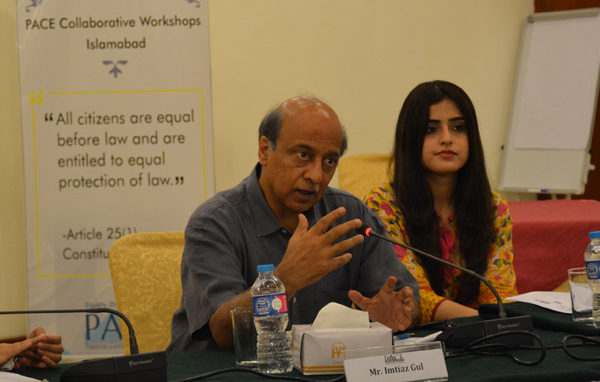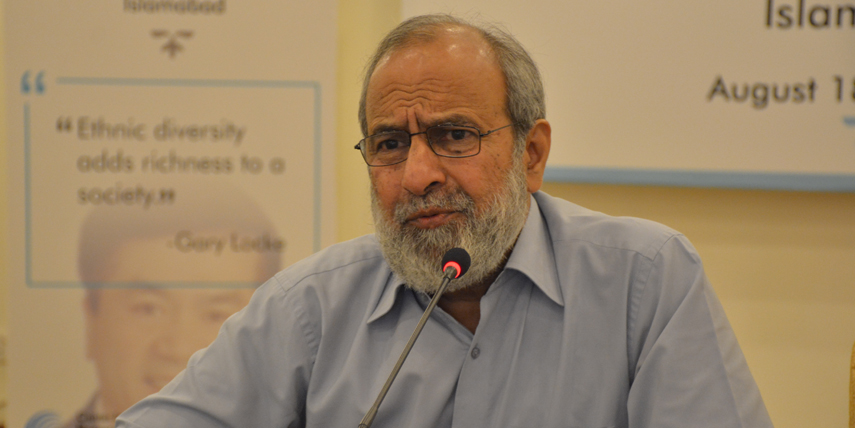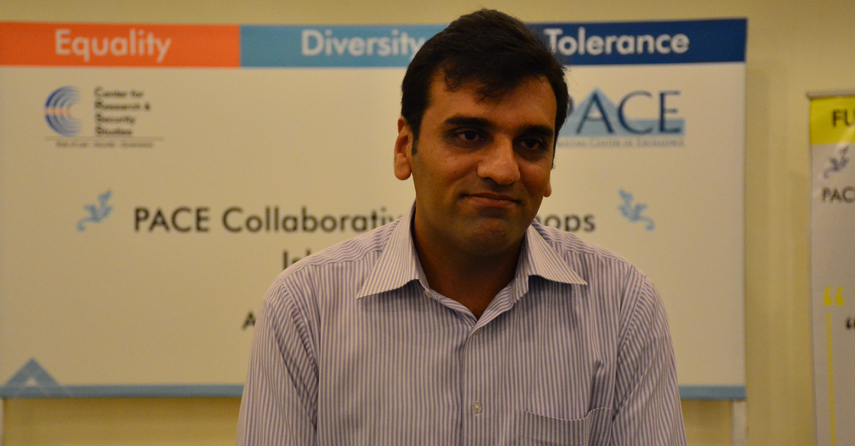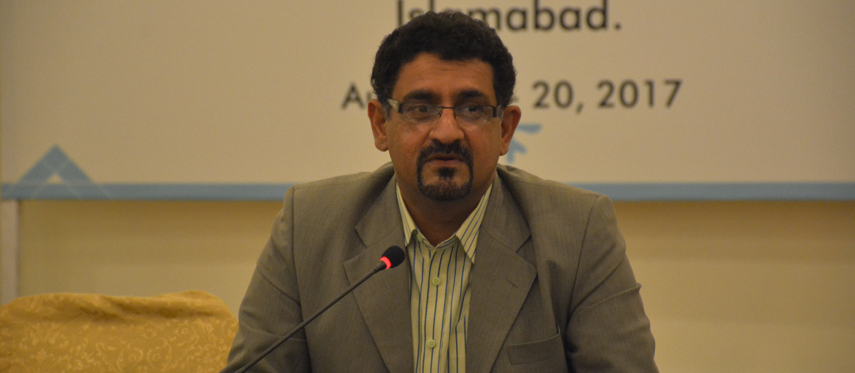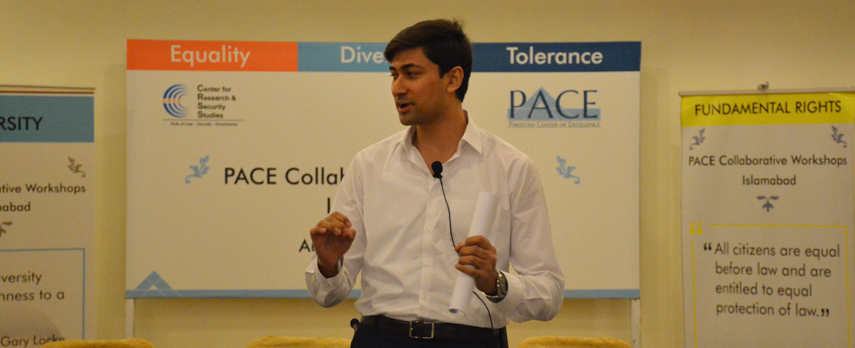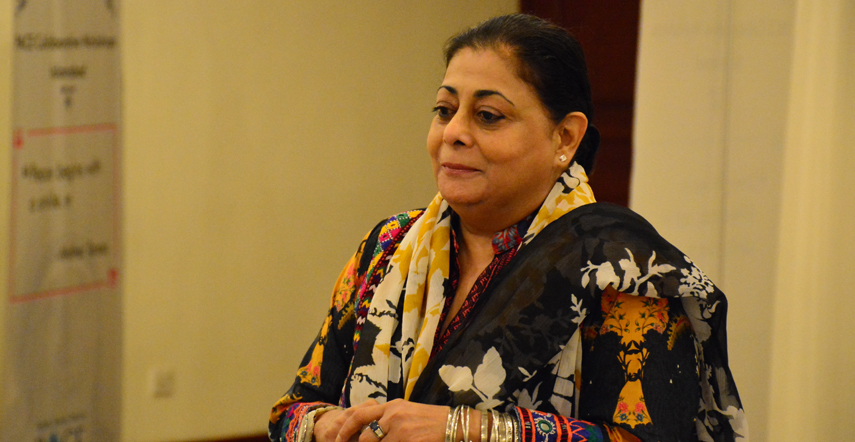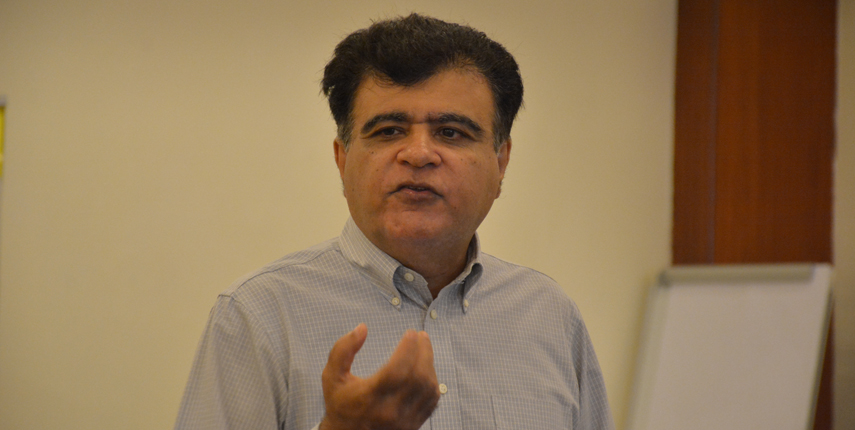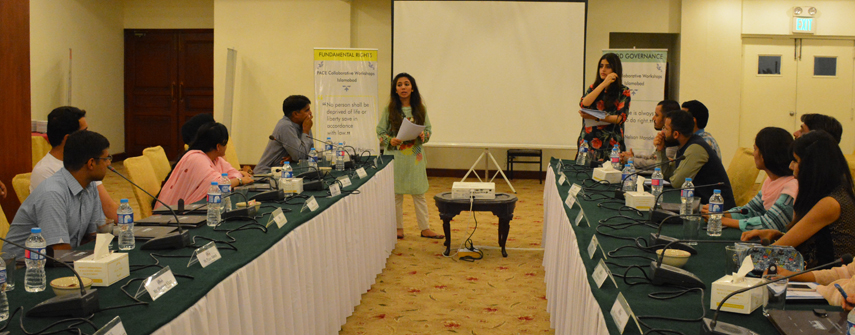The Center for Research and Security Studies (CRSS) conducted the 20th three-day PACE Collaborative workshop for young university lecturers and professors from August 18 – 20, 2017, at Hill View Hotel, Islamabad. The workshop was conducted under the umbrella of the Pakistan Center of Excellence (PACE), a counter-radicalization, pluralistic values focused project, in collaboration with the Dutch Government.
Participants included young university lecturers and professors from University of Sargodha, Sargodha, Sindh Agricultural University, Tando Jam, FATA University, FR Kohat, Women University of AJK and Bagh, Bagh, Government Girls Zubaida College, Hyderabad, Balochistan University of Information Technology, Engineering and Management Sciences, Quetta, Karakoram International University, Gilgit Baltistan, University of Haripur, Haripur, University of Lahore, Lahore, The Islamia University, Bahawalpur, and Preston University, Islamabad.
Opening Ceremony
Mr. Imtiaz Gul, Executive Director, CRSS, welcomed participants to the workshop, saying that PACE is put together by CRSS to counter radicalization, inculcate critical thinking, question preconceived notions and narratives, and embed the national discourse in constitution and the rule of law. He said that PACE is grounded in the universal values of tolerance and acceptance; tolerance is one virtue that leads to range of other factors such as perseverance, coexistence and the idea of peace building. He elaborated that adherence to rule of law, respect for diversity, opinions and rights, and ideas of perseverance, coexistence, peace building and tolerance can be inculcated in the minds of the youth only by the teachers ; the gate keepers of the future. Ms. Farhana Kanwal shared rules and regulations and program of the workshop with participants.
Workshop Core Areas
The young professionals were trained in following areas:
- Leadership and motivation
- Equal citizenry and respect for rule of law
- Fundamentals of democracy, governance and accountability
- Respect for diversity, opinions and rights
- Rights of minorities and other marginalized groups
- Constitutionalism, and adherence to Pakistan’s Constitution, particularly articles 8-28
- The importance of asking critical questions in the pursuit of knowledge
Workshop Modules
The cadre of young lecturers was trained by the experts in the above mentioned fields including: Dr. Khalid Zaheer, Mr. Ammad Khaliq , Dr. Zubair Ghouri, Mr. Mustafa Malick, Ms. Seemi Raheal, and Dr. Niaz Murataz.
Dr. Khalid Zaheer kicked off the first session of the day and spoke on the topic of religious intolerance. He explained, “Religious tolerance is the right one should give to others to believe in and practice faith of their choice. We can’t impose our views on others and we can’t blame others for their beliefs and ideas. You can’t respect a view despite of strongly disagreeing with it but you can show tolerance towards it. When we say, we allow others to have religious freedom and we can’t impose our point on other genuinely, that is called religious tolerance. We have no right to impose our beliefs on others. Our attitude toward others beliefs should be genuine and positive. People usually believe in and practice ideas and beliefs what they have learnt from their elders or what they have been convinced by. Islam teaches us not to use abusive language for other religions or faiths and respect them. If Islam says so; then why few Muslims are intolerant? There are a few arguments in front of them that are making them violent and intolerant. There is also a restrained religious setting who cut people off the society and there is always confinement in communication. Questioning is not allowed in such environments and they make you blindly follow the ones who lead such groups. We need to get rid of such environments, groups and thinking that are leading us to extremism and religiously intolerant society. We should not be violent towards the people who are not of same belief what we believe in. Everyone has right to do whatever they want and believe. Being humans, we expect others to tolerate us; same is what they expect from us.”
Mr. Ammad Khalique kicked off his session on “Media & Ethics”. He started with the definition of “Media” and “Ethics”, media is the collective communication outlet or tool that is used to store and deliver information or data. Specialized mass media channels include print media, social/digital media, photography, advertising, cinema, and broadcasting (Radio, TV). Speaking on the freedom of expression, he referred to Article 19 of the UN Charter, “Everyone has the right to freedom of opinion and expression; this right includes freedom to hold opinions without interference and to seek, receive and impart information and ideas through any media and regardless of frontiers.”
He defined ethics as the way people behave based on their beliefs about what is right and wrong and how it influences their behaviors and values. He shared his views on ethics in journalism with following points:
- Seek truth and report it
- Minimize harm
- Act independently
- Maintain standards of decency
- Be accountable
He also said that being neutral and presenting authentic news is one of the values that should be kept in mind while reporting certain issues. Media is bound in some cases and cannot be open and expose the facts. He said that words are sometimes misinterpreted and other times twisted when reporting sensitive issues; therefore, extreme care should be taken while debating on such issues. He stressed that the reporters while broadcasting should use decent language.
He shared few laws and ethics that are binding upon media:
- Cyber Stalking
- Cyber Bullying
- Cyber Masking
- Cyber Frauds
- Hate Speech
- Defamation
- Intrusion to Privacy
- Harassment
- Cyber Crime Bill 2016
- Cyber Wing (FIA)
Dr. Zubair Ghouri kicked off second session of the day on the topic of “respect for diversity, rights and opinions”. He said that as citizens of Islamic Republic of Pakistan, whenever we talk about humanity and humanitarian affairs, we are closely linked with the Islamic concept of human rights and equality. The constitution of Pakistan guarantees equal rights to all the citizens but the preamble restricts equal citizenry by defining the concept of divine sovereignty. But there are a few minority groups who don’t believe in divine sovereignty and on the basis of their beliefs we deprive them off the concept of equal citizenry.
Mr. Mustafa Malik also spoke of motivation and compared the close relation between rights and responsibilities to motivation and demotivation, as they cannot be separated. He insisted that failure only means you are closer to success as long as you learn from it and stay motivated. “The only thing stopping you from achieving something is yourself” he concluded.
Ms. Simi Raheal, a senior TV artist and a development sector activist, spoke on gender roles in media. She said, “In today’s age, media has become the social conscience. It’s a slow process to deconstruct the preconceived ideas and develop more understanding of gender roles in a more liberal way.”
She referred to a saying of Shakespeare that the entire world is a stage and all the men and women merely players. He didn’t know that today’s world will turn into a theatrical world: sad, intense and volatile. All the roles we play from birth to death are assigned by the society. The people in the context of religion and tribal practices construct society.
We cannot separate sex from gender; sex is something which is biological and gender is something where we are assigned tasks and responsibilities and it is in context of the society. All the responsibilities assigned by the society are inter-changeable. Media has taken control of people’s lives so much so that they don’t even know and realize. Gender is not only about women. When you understand the balance between men and women, the productivity increases. We stereotype people in media; women are used as source of attraction. If you show it on TV, you give it the stamp of approval on it.
Language is the first sign of the evolution of mind, it can be positive as well negative. We need to control the negative language from our media by rejecting it, by not seeing and working for it. We need to understand how this language can impact the coming generation and assure not to promote it. Stereotypical language and negative behaviors can affect the importance of gender.
We are all human and, by virtue of that, we are equal citizens. Constitution is the supreme law of the land and it guarantees equal rights to all of its citizens and tells us about our fundamental rights. Law should deal with all citizens as equals irrespective of any discrimination on the basis of sex, religion, creed, cast or social status.
Mr. Niaz Murtaza shared his views on the concept of democracy and good governance. He said that any institution at its initial stage is never stable, and the same is the case with democracy. But once it is stable and mature, democracy starts delivering. When we look back at the history of Pakistani politics, Pakistan has never been stable, he added. It could never see the fruits of stable and mature democracy. Political scientists state that from stable institutions emerge egalitarian societies. Egalitarian societies are the ones where people have equal access to education, capital, opportunities and freedoms. In such societies, strong institutions, able leadership and good governance emerge and development takes place.
Ms. Farhana Kanwal, Project Coordinator PACE, in her concluding remarks, insisted that there is a dire need to revisit the widespread preconceived notions that have been passed through our cultural values in the society over generations. Teachers, with the responsibility of imparting values to the young generation in educational institutions, are the most valuable engines that can challenge common negative narratives that promote hatred and bigotry. She said that teachers have the ability to shape an entire generation’s mindset to propagate tolerance, diversity and equality.
She shared that participants need to conduct these activities with their students to inculcate adherence to the rule of law and equal citizenry. CRSS provides financial and logistic support in this regard to lecturers and professors so that they can foster the universal ideals of tolerance and diversity in the young generations.

